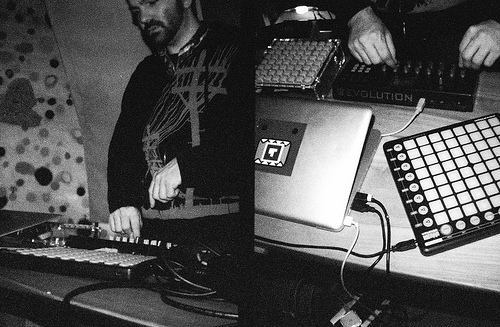Speak to some people about ‘electro’ music and they’ll tell you it’s a recent phenomenon that should be consigned to history quicker than it emerged. However, the real history of electronic music begins in the early 20th century.

Early Days Electro
While various examples of recording equipment were produced in the late 1800s, the Theremin is widely considered the first electronic instrument, unique for the time in that it didn’t actually require anyone to physically play it to create a sound.
Other instruments would be created throughout the 1920s, as well as early production equipment, including amplifiers. Electronic recording equipment was also starting to become more sophisticated into the 1930s, prior to the Second World War.
Development through the 40s and 50s
Tape recorders would start to become popular in the 40s, and would lead to the rise of electroacoustic tape music.
The major piece of work conducted during this time came from Paris, the now famous Musique Concrète movement. This involved composers bringing together a variety of different sounds and recording them onto the same tape, essentially the birth of mixing.
By now, electronic music was becoming popular around the world, with movements across Europe and North Africa, as well as in Japan and the United States, ensuring that early sub-genres of electro were established, particularly as different instruments and techniques were at different stages of knowledge and development in these locations.
60s and Synthesizers
Electronic music would struggle for exposure in the 1960s, owing to the continuing surge in popularity of traditional rock and roll and the emergence of musical giants like The Beatles and The Rolling Stones.
During this decade, however, the first synthesizers would be invented (although they wouldn’t become popular or widely used until the 1970s), and computer music and live use of electronics in performance would start to become established.
Coming to the Fore
While popular composers throughout the 1970s and into the 1980s would use electronics to create their sound, it was the rise of progressive rock, and the popularity of bands like Pink Floyd, Yes, and Rush that would start to herald the true electronic music era.
Such equipment would eventually start to see instruments phased out of some bands altogether and a greater reliance on electronics to create ‘synth pop’ and ‘pop rock,’ to name but two genres. Again, some of the most legendary names in music, including Culture Club and Duran Duran, would become famous, and still are, because of these styles.
The Rise of Dance
The late 1980s and the 1990s is the time when dance music was born. The volume was turned up, and in some cases, tracks had vocals completely removed to literally just feature an electronic beat and sequences. Continuing advancements of music technology and accessibility meant that dance would continue to grow, and has done so into the 21st century, too.
In addition, modern electronic production technology has also aided the development of genres such as dubstep, but has had a huge influence on the music industry in general and continues to be heard across various genres from a number of artists.
Image Source: Peter Kirn
Are you a guitarist? Check out our full range of online guitar lessonsAre you a saxophonist? Check out our full range of online saxophone lessons
Subscribe to Pro Music Tutor from as little as £7.99 per month
Related Posts
-
Is Music Theory Important to Modern Musicians?
The importance of music theory is a hot debate topic in the world of professional music. Some believe knowledge of music theory is what makes you a true musician, whereas some feel their lack of music theory knowledge is like a badge of honour. With the eternal debate over the importance of music theory raging […]
View All >> -
5 Ways Spanish Music Influenced the World
Contemporary popular music has transcended all national boundaries, with different types of music being performed and listened to in all corners of the world. Each culture also adds their own little tweaks and twists to the music, constantly creating new sounds and influences. Spanish music has deeply influenced the popular music we listen to today. […]
View All >>
Latest Blog Entries
-
The Benefits of Online Music Education
Learning music has never been easier, since the internet and modern technological advancements have opened the doors to countless possibilities, expanding the subjects people can choose from and how the lessons are taught. Now, people can study a whole host of music-related topics; from learning to play guitar or DJing, to understanding the inner workings […]
View All >> -
Essential Jazz Guitar Scales that are Easy to Learn
Improvising in jazz requires the ability to play in different keys over different chords. Results certainly do not come overnight, but with diligent practice, you would be surprised by what you can achieve. Many people ask me about what scales I use as if they were some big secret. While knowing your scales is very […]
View All >>
Blog Categories
- Categories
- Guitar Tips (93)
- History (36)
- How-To (38)
- Interviews (3)
- Music Industry (121)
- Prolinks Guitar (2)
- Prolinks Lessons (3)
- Prolinks Tutor's Profile (1)
- Saxophone Tips (40)
- Uncategorized (6)
Tags
Archive
- November 2018 (1)
- February 2018 (1)
- December 2017 (1)
- November 2017 (1)
- October 2017 (1)
- July 2017 (4)
- May 2017 (2)
- April 2017 (1)
- August 2016 (2)
- July 2016 (1)
- June 2016 (2)
- May 2016 (3)

